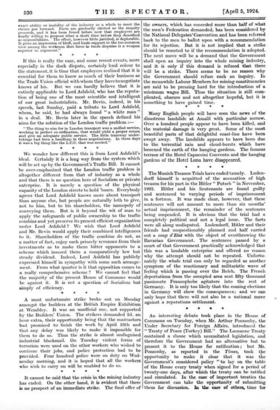We wonder how different this is from Lord Ashfield's ideal.
Certainly it is a long way from the system which will be set up by the Government's Traffic Bill. It cannot be over-emphasized that the London traffic problem is altogether different from that of industry as a whole and that there is no question here of Socialism or private enterprise. It is merely a question of the physical capacity of the London streets to hold 'buses. Everybody agrees that Lord Ashfield knows more about transport than anyone else, but people are naturally loth to give, not to him, but to his shareholders, the monopoly of conveying them. But is it beyond the wit of man to apply the safeguards of public ownership to the traffic combine and yet preserve its present efficient organization under Lord Ashfield ? We wish that Lord Ashfield and Mr. Bevin would apply their combined intelligences to it. Shareholders of the traffic combine do not, as a matter of fact, enjoy such princely revenues from their investments as to make them bitter opponents to a scheme which insured them a comparatively low but steady dividend. Indeed, Lord Ashfield has publicly expressed himself in sympathy with some such arrange- ment. From what quarter is it that opposition comes to a really comprehensive scheme ? We cannot feel that the majority of the present House of Commons would be against it. It is not a question of Socialism but simply of efficiency.
* * * *


























































 Previous page
Previous page